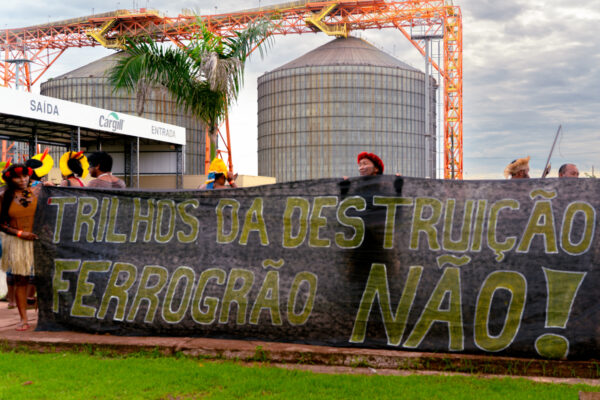After a successful decade long struggle to keep oil exploitation off of their sacred homeland, the 7,000 member U’wa indigenous community from the remote cloud forests of northeastern Colombia are vowing to continue their peaceful opposition to oil drilling on their land in light of this week’s announcement by Colombia’s state oil company—Ecopetrol—that preliminary results from a test well indicated recoverable amounts of crude.
Since Los Angeles-based Occidental Petroleum (OXY) and Royal Dutch Shell first received drilling rights in 1992 to the Siriri block (formerly Samoré), the project has become a lightening rod for controversy and a public relations nightmare for the companies involved. Dubbed a ‘flashpoint’ by the industry and condemned by environmental and human rights groups the world over, the project has become the focus of one of the most intensive campaigns against an oil project in recent history. Faced with mounting local and international opposition, Shell pulled out of the project in 1997 before drilling began. OXY pressed forward, but the project proved too problematic. In Colombia, the project faced legal actions, months-long roadblocks, work slippages, geological challenges, and rebel attacks due to the country’s long-standing civil war. At home and around the world, Occidental Petroleum and its shareholders were besieged by hundreds of non-violent protests. Ultimately, in May 2002, the company announced it was ceding drilling rights to the Gibraltar1 well site and the larger Siriri oil block to Ecopetrol after investing an estimated $100 million in exploring and test drilling.
Regardless of which company plans to drill on their land, the U’wa have made their opposition clear. In a communiqué issued March 4, 2003 (full text follows), the U’wa state: “We are here to remind Ecopetrol, the national government, Occidental Petroleum, and the world, that we will never change our position. The U’wa will never negotiate or sell our mother earth, nature, the environment, our culture, our history, and our higher laws. For the U’wa, all of this is not to be sold. It represents our right to live, which takes preference over any right, be that economic, social, or political . . . It is clear that Ecopetrol, the national government, and OXY have been and continue to be directly responsible for the destruction, and gradual and forced disappearance of our history and culture that is part of our ancestral heritage as a people. All we are demanding is our healthy territory, peace, and tranquility in order to live in harmony with nature and in this way, follow the laws our God Sira gave us.”
While Ecopetrol still awaits official results of its test drilling, a potential find represents a watershed moment for the future of the U’wa people. The well site is located just 500 meters from the legally titled U’wa Reserve and is on land that the U’wa owned but that OXY forcibly expropriated. Oil activity here has already started to bring Colombia’s bloody 4-decade-old civil war to the U’wa’s doorstep. As Ecopetrol pushes deeper into the heart of legalized U’wa territory to begin more test drilling and seismic testing – – as the company’s written notice of Feb. 11, 2003 to the U’wa suggests, the violence will undoubtedly increase. Regardless which company extracts oil from U’wa land, OXY will still profit from transporting oil from Gibraltar1 through its Caño Limón pipeline, which borders U’wa territory.
OXY’s Caño Limón operations are a telling indication of the great human and environmental tragedy in store for the U’wa and their pristine cloud forest ecosystems if the project moves forward. The pipeline has been bombed over 1000 times and spilled nearly 11 times the amount of the Exxon Valdez spill. Oil is a magnet for violence in Colombia and oil infrastructure is one of the main battlegrounds of the war. Oil provides a source of revenue for all the armed actors either through war taxes, extortion, payoffs, or outright theft, while innocent civilians are being killed in the crossfire. In response to intense OXY lobbying and the “War on Terror,” U.S. military aid to Colombia has increased dramatically; with OXY slated to receive nearly $100 million a year in protection from U.S. trained Colombian soldiers dedicated to defending the pipeline.
“Perversely, we see drilling rights are more respected than human rights. It says something about the future of mankind and the planet when an entire culture is made expendable for a few days of oil,” stated Kevin Koenig, an Oil Campaigner with Amazon Watch. “If this project moves forward, the U’wa are going to pay the true costs of America’s other addiction in Colombia—oil,” added Koenig.
The U’wa are one of many indigenous peoples around the world—from Nigeria to Alaska, to Ecuador—who are faced with the true environmental and social costs of the world’s insatiable appetite for oil. Instead of subsidizing Colombia’s oil war, our tax dollars should be dedicated to an aggressive plan to convert to renewable energy alternatives. Otherwise our oil addiction will continue to take an irreversible toll on people, peace and the planet. Note: Background information available on www.amazonwatch.org.
# # #













